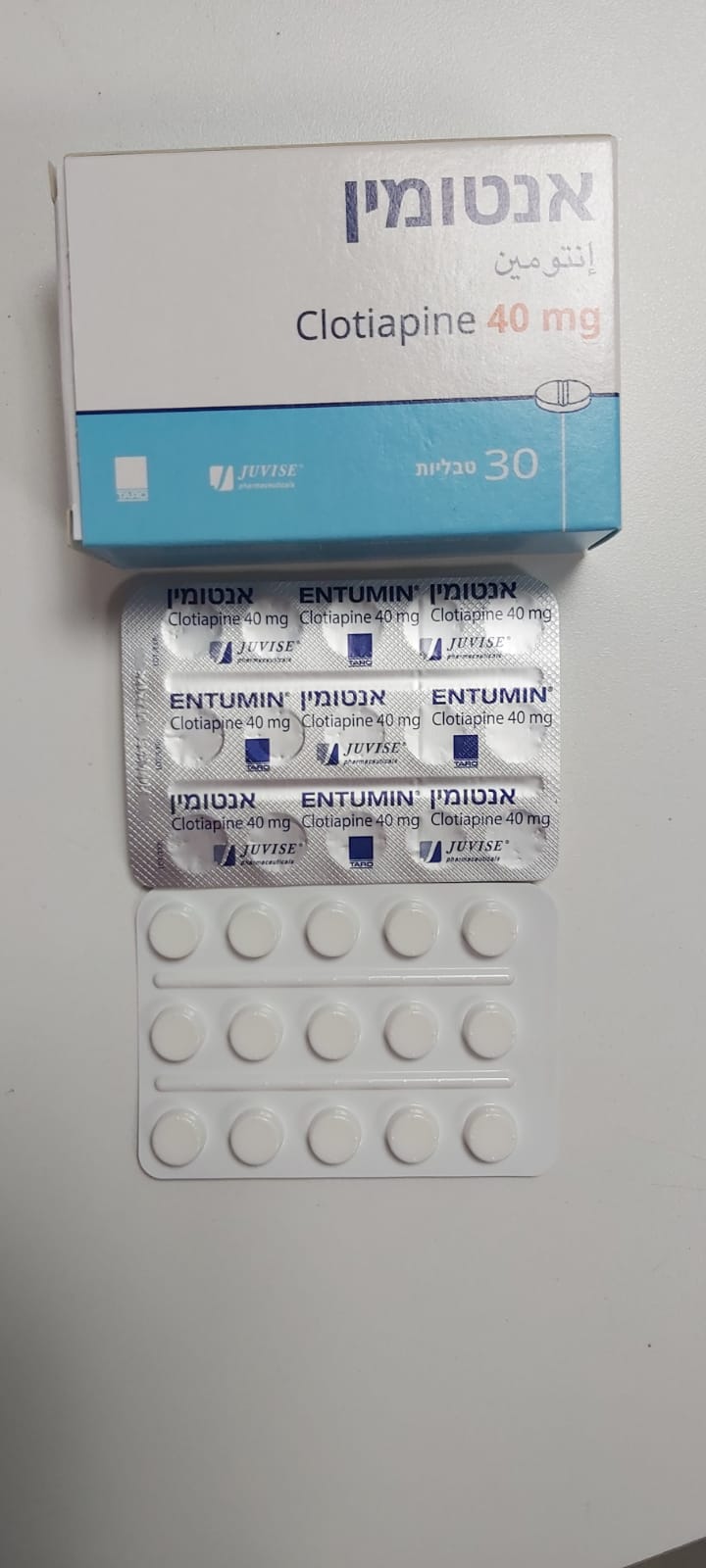Quest for the right Drug

אנטומין ENTUMIN ® (CLOTIAPINE)
תרופה במרשם
תרופה בסל
נרקוטיקה
ציטוטוקסיקה
צורת מתן:
פומי : PER OS
צורת מינון:
טבליה : TABLETS
עלון לרופא
מינוניםPosology התוויות
Indications תופעות לוואי
Adverse reactions התוויות נגד
Contraindications אינטראקציות
Interactions מינון יתר
Overdose הריון/הנקה
Pregnancy & Lactation אוכלוסיות מיוחדות
Special populations תכונות פרמקולוגיות
Pharmacological properties מידע רוקחי
Pharmaceutical particulars אזהרת שימוש
Special Warning עלון לרופא
Physicians Leaflet
Special Warning : אזהרת שימוש
4.4 Special warnings and precautions for use Caution should be exercised: - in elderly patients, due to their high sensitivity (sedation and hypotension); - in severe cardiovascular disorders, due to haemodynamic changes, especially hypotension; - in patients with renal and/or hepatic impairment, due to the risk of overdose; - in patients with prostatic hypertrophy, marked intestinal atony; - in patients with Parkinson’s disease. Cases of venous thromboembolism (VTE) have been reported with antipsychotic medications. Since patients treated with antipsychotic agents often have acquired risk factors for VTE, all possible risk factors for VTE must be identified before and during Entumin treatment and preventive measures must be taken. During all antipsychotic treatments, intense initial sedation and several days of immobilisation may promote thrombus formation in predisposed patients. In the event of hyperthermia, treatment must be suspended, since such hyperthermia may be one of the constituents of the malignant syndrome (pallor, hyperthermia, autonomic disorders) described with neuroleptics. Discontinuation of treatment must be gradual; any concomitant antiparkinson medications must be administered for longer, in view of their generally shorter plasma half-life. As with other neuroleptic agents, hyperprolactinaemia such as that induced by taking Entumin may worsen the prognosis of breast cancer, although no formal link has been established. Entumin should be administered with caution in such situations. Class effects An increased risk of adverse cerebrovascular reactions has been observed in patients with dementia treated with some atypical antipsychotic agents. The mechanism for this increased risk is not known. An increased risk cannot be excluded for other antipsychotics or other patient populations. Caution is recommended when using Entumin in the treatment of patients with risk factors for stroke. In elderly patients with dementia-related psychosis, the efficacy and safety of Entumin have not been studied. Observational studies suggest that elderly patients with dementia-related psychosis treated with antipsychotics are at increased risk of mortality. In the literature, risks predisposing this patient population to an increased risk of mortality when treated with antipsychotics are: anaesthesia, the presence of cardiac disorders (e.g. cardiac arrhythmia) or lung disorders (e.g. pneumonia, with or without aspiration). Caution is recommended when using Entumin in the treatment of dementia. As with other antipsychotics, caution is recommended in patients with known cardiovascular disease or a family history of QT interval prolongation and caution is recommended when Entumin is prescribed at the same time as medicinal products known to prolong the QTc interval. In clinical trials and/or in post-marketing experience, events of leukopenia/neutropenia have been reported temporarily associated with antipsychotic agents. Cases of agranulocytosis have also been reported. Risk factors for leukopenia/neutropenia include a pre-existing low white blood cell count and a history of drug-induced leukopenia/neutropenia. In patients with a history of a low and clinically significant white blood cell count or drug-induced leukopenia/neutropenia, a full blood count should be performed frequently during the first few months of therapy and discontinuation of Entumin treatment should be envisaged at the first sign of any clinically significant decrease in the number of white blood cells in the absence of any other causative factors. Patients with clinically significant neutropenia should be carefully monitored for fever and other symptoms or signs of infection and treated rapidly if such symptoms or signs occur. Treatment with Entumin must be discontinued in patients with severe neutropenia (absolute neutrophil count <1,000/mm3) and their white blood cell count must be monitored until it returns to normal.
Effects on Driving
4.7 Effects on ability to drive and use machines Entumin can cause somnolence, especially at the start of treatment, and thus diminish the patient’s ability to react. Sedation is greatly increased upon concomitant use of alcohol or other agents with a depressant effect on the CNS (hypnotics, tranquillisers, analgesics, antihistamines).

שימוש לפי פנקס קופ''ח כללית 1994
Schizophrenia & related psychoses, affective disorders, anxiey, neuroses, excitation, sleep disorders
תאריך הכללה מקורי בסל
01/01/1995
הגבלות
תרופה שאושרה לשימוש כללי בקופ'ח
מידע נוסף
